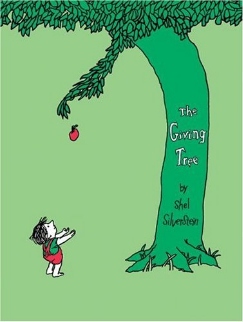October 9, 2014
HarperCollins ups royalty for books sold through their website
by Sal Robinson

“The Giving Tree” is a HarperCollins book. But probably shouldn’t be a guide for HarperCollins royalty offers. Image via Wikipedia.
Publishers’ websites have historically been pretty much the last place that readers go to buy books. If you asked a roomful of people, even a roomful of people at a reading, if they’d ever bought a book from a publisher’s website, the likelihood of any hands going up would be very low—most publishers don’t invest much energy in making their websites places where you would either think to or want to buy books. (Melville House, however, is not one of those publishers.)
Which means that ecommerce sales go to Amazon. But HarperCollins is working on a new way to solve this problem: instead of trying to attract readers to their site, they’re giving authors incentives to direct traffic to HarperCollins. And by “incentives,” I just mean more money.
In their press release, they describe it as
an e-commerce program which will allow authors to earn an additional 10% net royalty on print, e-book, and physical audio products sold through the HarperCollins platform. As an example, authors earning a 25% net royalty will now receive a 35% net royalty on e-books sold through the HarperCollins platform.
Just in case you, as an author, cannot do very, very simple math.
But anyway, this is interesting, and 10% more is a significant offer (by comparison, when publishers are negotiating with authors, it’s usually over 2-5% increases in royalty rates). I also can’t help but wonder if that 35% echoes the 35% being discussed in the ongoing negotiations between Amazon and Hachette. Is HarperCollins not so subtly trying to suggest to its authors that it will offer them the same terms as Amazon?
Authors can participate in the program in a couple of ways: by installing “buy” buttons leading to the Harper site or adding the HarperCollins shopping cart onto their personal sites, or by linking to www.hc.com in posts on social media. If I were a HarperCollins author, I would also lobby for the royalty on sales initiated by me in other ways, such as singing “My book is available on www.hc.com” very loudly in the shower in the mornings or cakes baked by me and given to friends with the words “If you’re really grateful, go to hc.com” written in frosting on the top.
The big question is how many authors will join in, and whether this program will draw sales away from Amazon. In announcing it, President and CEO Brian Murray got in a clear dig at the retailer, saying “Our authors can also be certain that their books will always be available to consumers through HarperCollins, even if they are difficult to find or experiencing shipping delays elsewhere.”
As my colleague Kirsten Reach pointed out earlier this year, this is probably a defensive move:
Hachette is the first to renegotiate its terms with Amazon, but no doubt the other big publishers are preparing for battle. HarperCollins doesn’t want to lose weeks of sales if their negotiations with Amazon are as drawn-out and painful as they have been for Hachette.
It’s also part of a larger strategy of finding other ways to do direct-to-consumer sales. Harper has, for instance, launched sites for some of their big brands, like the Chronicles of Narnia; at Narnia.com, you can buy print books, ebooks, audio books, and gift editions. (But no Turkish delight, boo hiss.)
Personally, I hope one new Harper author, Amy Poehler, whose memoir Yes Please goes on sale at the end of this month, takes full advantage of the program and spends all her ten percents on the further adventures of Abbi and Ilana of “Broad City,” especially their rhythmic adventures.
Sal Robinson is an editor at Melville House. She's also the co-founder of the Bridge Series, a reading series focused on translation.